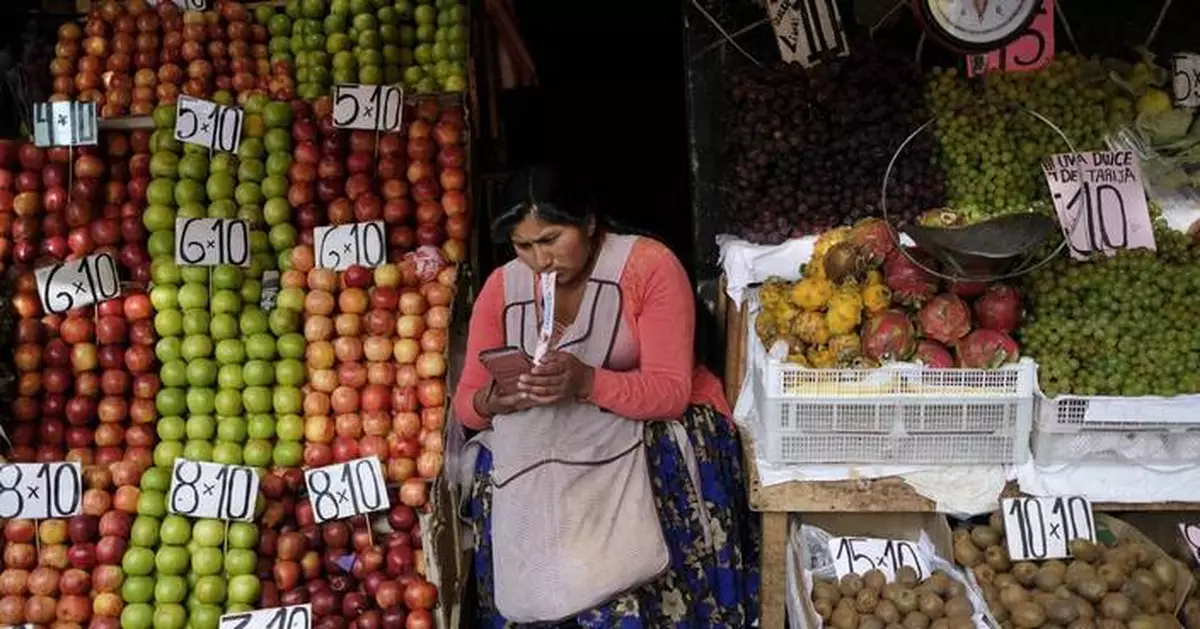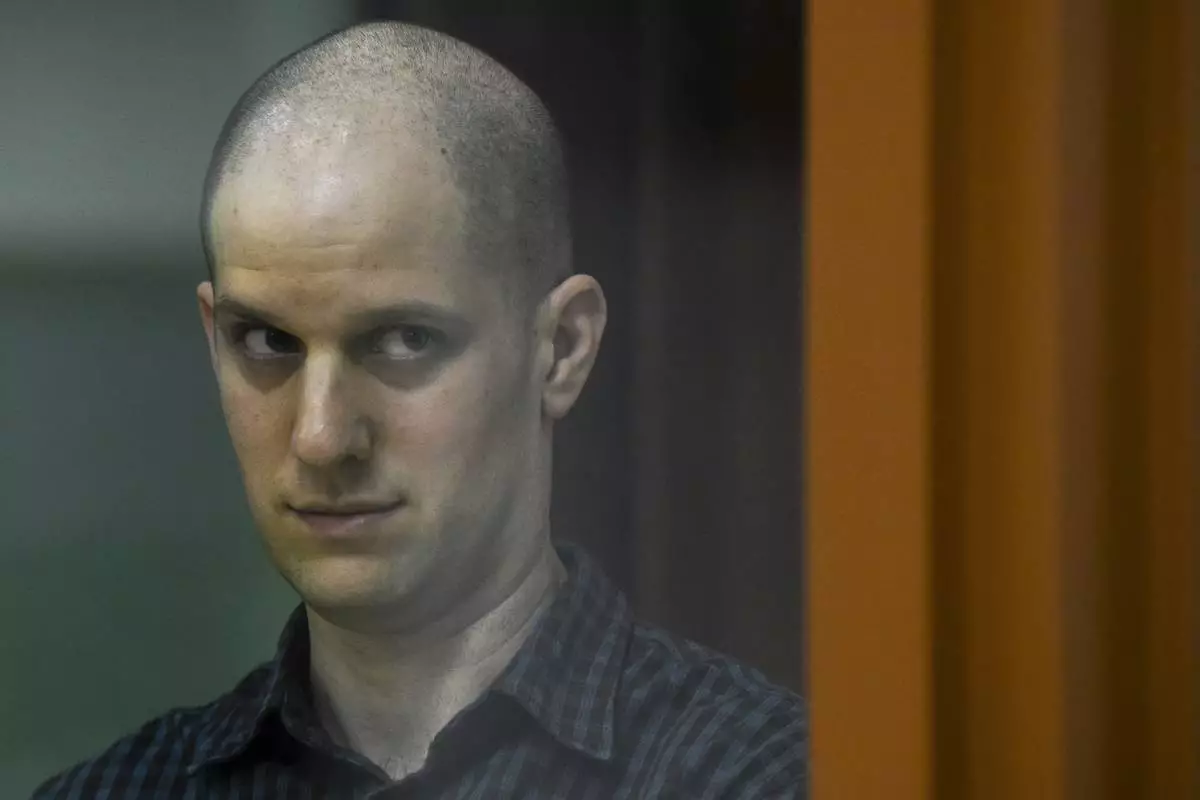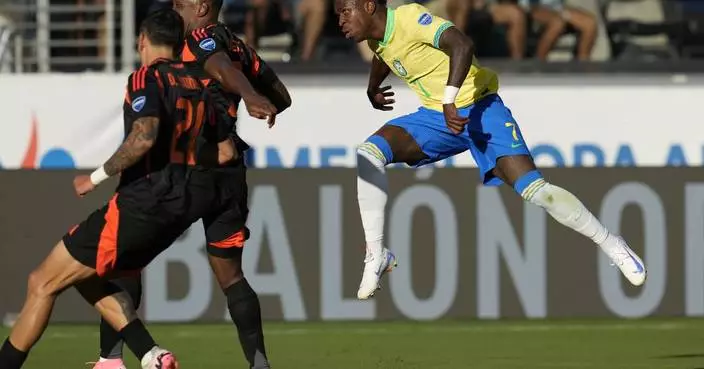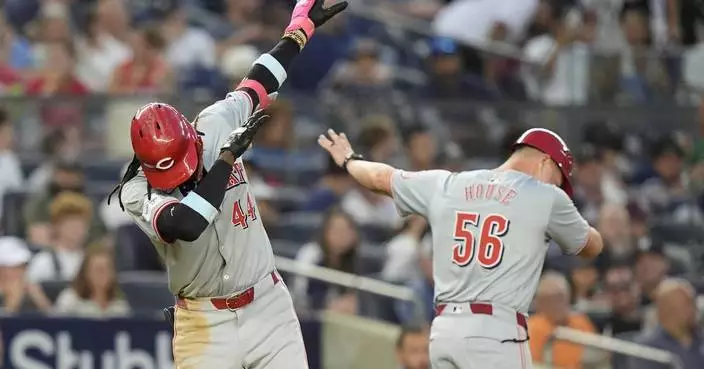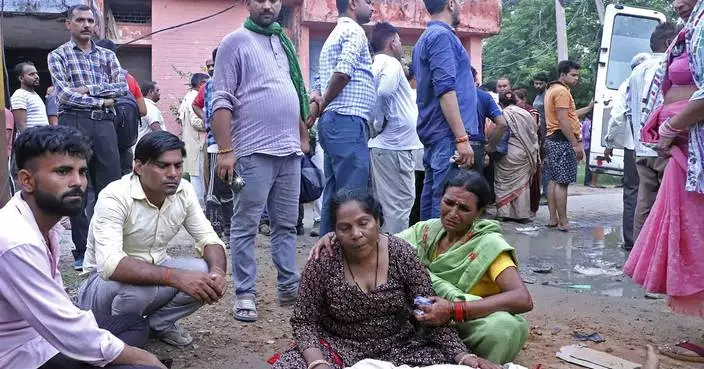LA PAZ, Bolivia (AP) — Signs reading “I'm buying dollars” line the doors of Víctor Vargas’ shoe shop in the heart of Bolivia’s biggest city, a desperate attempt to keep his family business alive.
Just a few years ago, the 45-year-old Vargas would unlock the doors at 8 a.m. to a crush of customers already waiting to buy tennis shoes imported from China. Now, his shop sits hopelessly empty.
“Right now, we’re in a dreadful crisis,” he said. “No one buys anything anymore. … We don’t know what’s going to happen.”
Bolivians like Vargas have been hit hard by economic turmoil in the small South American nation fueled by a longtime hyper-dependence on, and now shortage of, U.S. dollars.
The economic downturn has been exacerbated by an ongoing feud between President Luis Arce and his ally-turned-rival former President Evo Morales in the lead-up to next year's presidential election. Many Bolivians impacted by the crisis have lost trust in Arce, who denies the country is even in an economic crisis.
“Bolivia has an economy that’s growing. An economy in crisis doesn’t grow,” Arce told The Associated Press in an interview. That was contradicted by both economists and dozens of Bolivians.
That deep distrust came to a head on Wednesday following a spectacle which the government called a “failed coup d’etat” and opponents including Morales called a staged “self-coup” meant to earn the unpopular leader political points before elections.
Whether the coup attempt was real or not, most Bolivians who spoke to the AP said they no longer believe what their leader says, and say Arce would be better served addressing Bolivia’s gasping economy and less time carrying out political stunts.
“He should think about Bolivia’s economy, make a plan to move forward, find a way to get dollars and work to move Bolivia forward," Vargas said. "No more of these childish ‘self-coups.’”
That simmering anger has paved the way for even more strife in a country that is no stranger to political unrest.
Bolivia's economic crisis is rooted in a complex combination of dependence on the dollar, draining international reserves, mounting debt and failures to produce products like gas, once the Andean nation's economic boon.
This has meant that Bolivia has largely become an import economy “totally dependent on dollars,” said Gonzalo Chávez, an economist with Bolivia’s Catholic University. That once worked in Bolivia's favor, driving the country's “economic miracle” as it became one of the region’s fastest growing economies.
Vargas’ family opened the shoe business nearly 30 years ago because they saw it as a surefire way to ensure stability for coming generations. The family imports shoes from China, which they pay for in dollars and sell them in Bolivia's currency, bolivianos. Without dollars, they have no business.
The shortage of dollars has led to the emergence of a black market, with many sellers bringing in greenbacks from neighboring Peru and Chile and selling them at a gouged price.
Pascuala Quispe, 46, spent her Saturday walking around La Paz's downtown going to different currency exchange shops, desperately searching for dollars to buy car parts. While the official exchange rate is 6.97 bolivianos to the dollar, she was told the real price was 9.30 bolivianos, far too high a price for her. So she kept walking, hoping to find luck elsewhere.
Gouged prices have trickled down to everything. People have stopped buying shoes, meat and clothing, and that has pushed working class people deeper into poverty. Bolivians make jokes about having “mattress banks,” storing cash at home because they don’t trust banks.
“There are no jobs. ... and the money we earn isn't enough for anything," Quispe said. “Everyone suffers.”
Some vendors like Vargas paste signs on their business doors, hopeful sellers will trade dollars at a more reasonable price.
It’s a complicated economic bind that has few short-term solutions, said Chávez, the economist.
But Arce insists that Bolivia’s economy is “one of the most stable” and says he's taking action to address problems ailing Bolivians, including shortages of dollars and gasoline. He said the government is also industrializing, investing in new economies like tourism and lithium.
While Bolivia sits on the world’s biggest stores of lithium, a high-value metal key to transitioning to a green economy, investment is only viable in the long term, largely due to government failures, said Chávez. Meanwhile, inflation has outpaced economic growth, and most Bolivians face unstable work conditions with minuscule pay.
That is only compounded by ongoing fights between Arce and Morales, who returned from exile after resigning during unrest in 2019, which Morales maintains was a coup against him. Now the former allies have slung insults and fought over who will represent their Movement for Socialism party, known by its Spanish acronym MAS, ahead of 2025 elections.
“Arce and Evo Morales, they fight over who is more powerful,” Vargas said. “But neither govern for Bolivia. ... There’s a lot of uncertainty.”
Broad discontent has fueled waves of protests and strikes in recent months. Protests and road blocks have dealt another economic blow to Vargas, the shoe vendor, because customers from all over the country no longer travel to buy products because of the chaos of ubiquitous protests.
Morales, who still wields a great deal of power in Bolivia, blocked Arce’s government from passing measures in Congress to ease the economic turmoil, which Arce told the AP was a “political attack.”
Morales has fueled speculation that the military assault on the government palace last week allegedly led by former military commander José Zúñiga was a political stunt organized by Arce to gain sympathy from Bolivians. The claim was first made by Zúñiga himself upon his arrest.
“He tricked and lied to, not just the Bolivian people, but the entire world,” Morales said in a Sunday radio program.
The political spats left many like 35-year-old Edwin Cruz, a truck driver, shaking their heads as they wait for hours, sometimes days, in long lines for diesel and gasoline because of intermittent shortages caused by lack of foreign currency.
“Diesel is like gold now,” he said. “People aren't idiots. And with this whole thing with the ‘self-coup’ this government has to go.”
Cruz is among those who don't want to vote for either Morales or Arce. While Bolivians have few other options, Chávez said discontent opened a “small window” for an outsider to gain traction, just as it has with a number of Latin American outsiders in recent years.
Most recently, self-described “anarcho-capitalist” Javier Milei has taken the helm of neighboring Argentina with promises to lift the country out of its economic spiral, which shares a number of similarities with Bolivia's.
Meanwhile, Vargas doesn't know what he'll do with his family's shoe store. Once a point of pride, the shop has turned into a financial drain. He would pass it down to one of his four children, but all of them want to leave Bolivia. One of his children has already migrated to China.
“They don't want to live here anymore,” Vargas said in his empty store. “Here in Bolivia, there's no future.”
Follow AP's coverage of Latin America at https://apnews.com/hub/latin-america
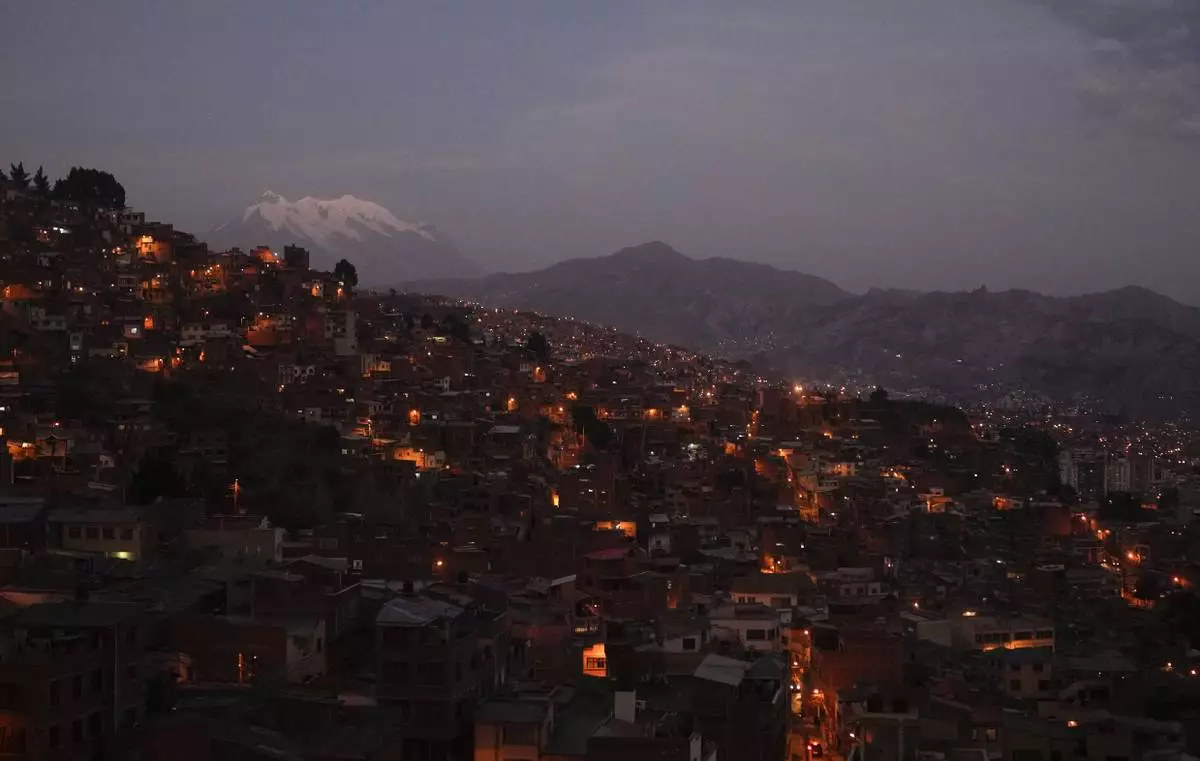
An aerial view of La Paz, Bolivia, Saturday, June 29, 2024, backdropped by the snow-capped Illimani mountain, days after Army troops stormed the government palace in what President Luis Arce called a coup attempt. (AP Photo/Juan Karita)
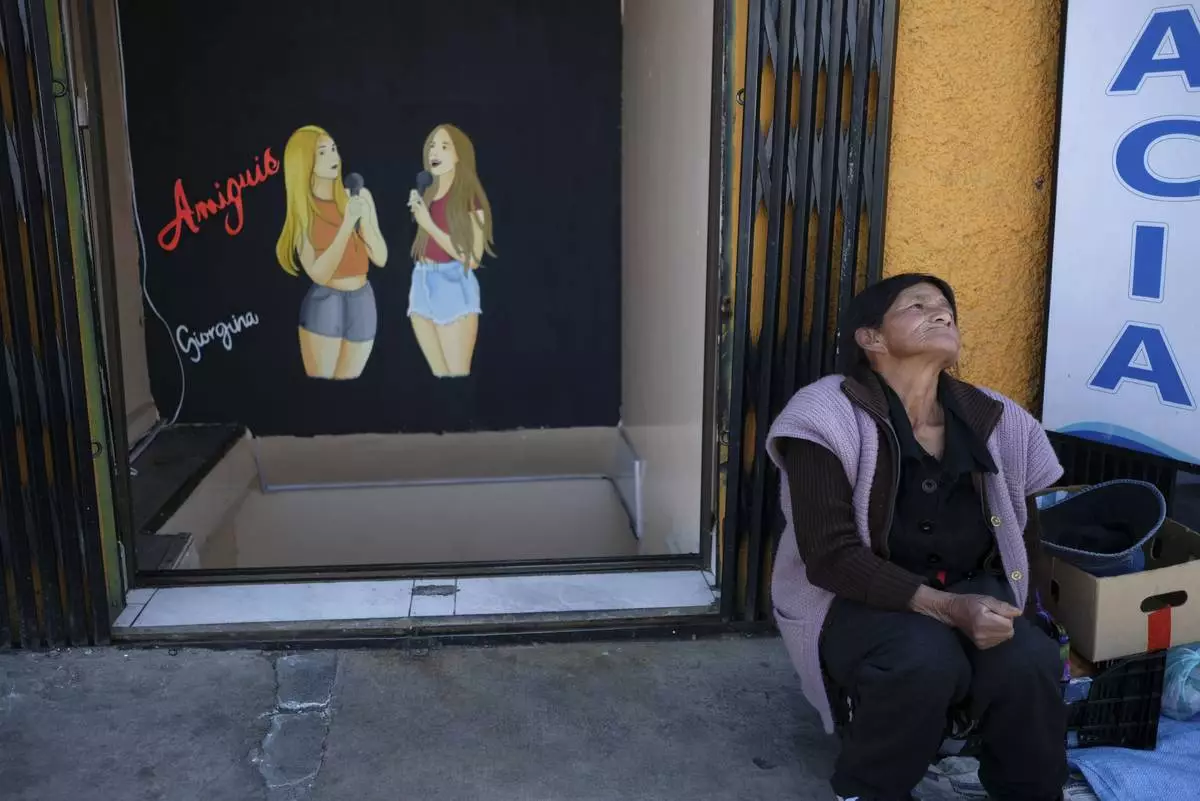
A woman sits at the entrance of a restaurant in La Paz, Bolivia, Friday, June 28, 2024, two days after Army troops stormed the government palace in what President Luis Arce called a coup attempt.(AP Photo/Carlos Sanchez)
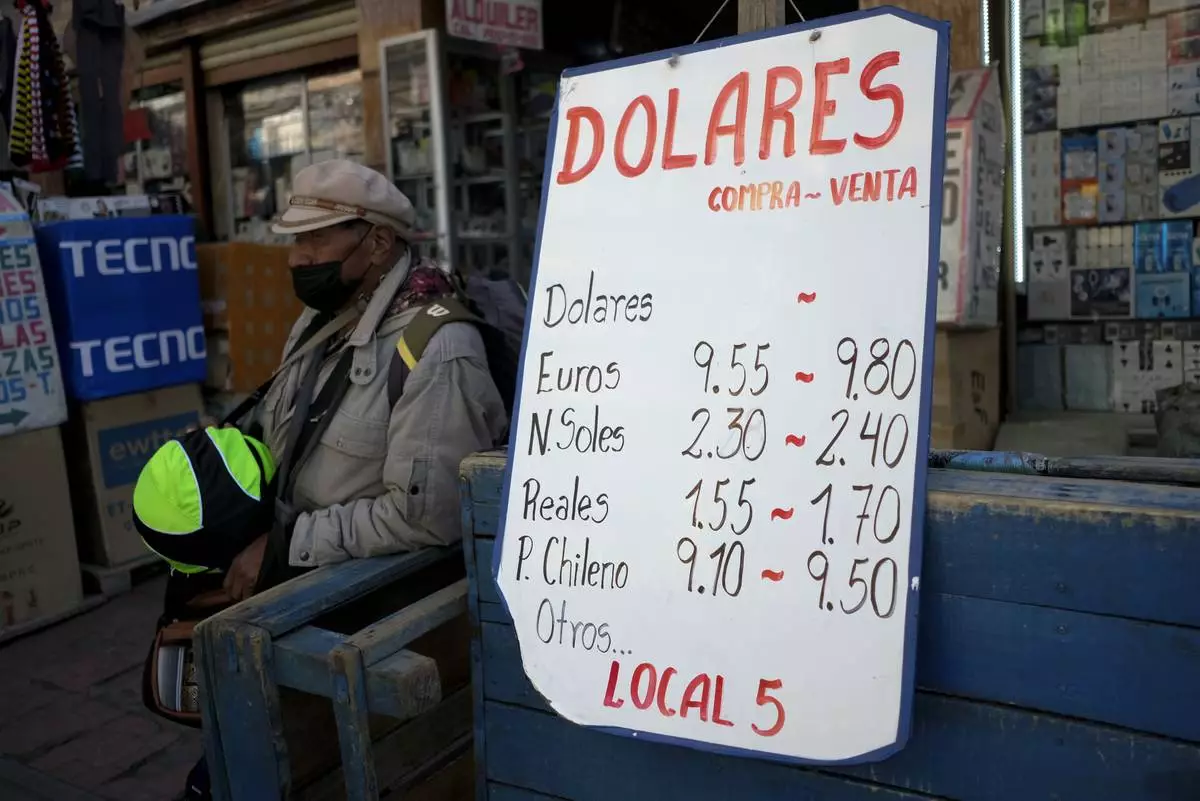
A sign displays currency exchange rates in La Paz, Bolivia, Friday, June 28, 2024, days after Army troops stormed the government palace in what President Luis Arce called a coup attempt. (AP Photo/Carlos Sanchez)
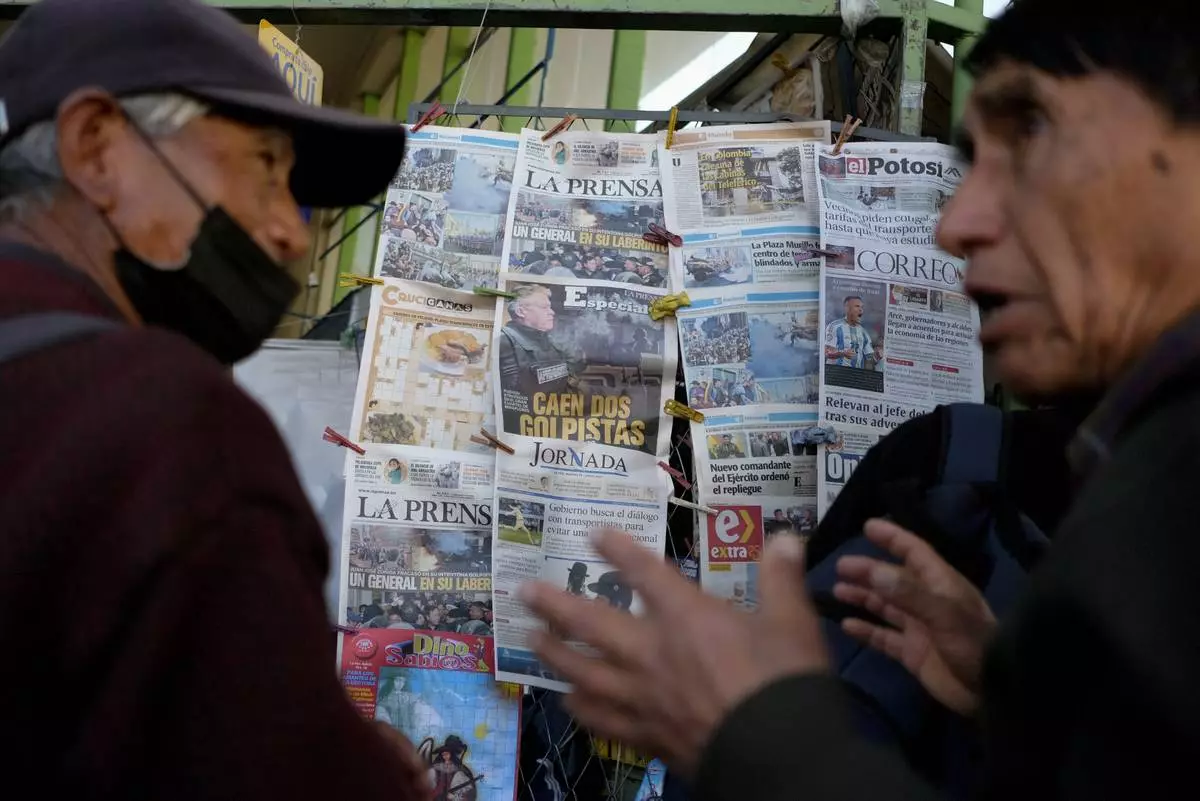
Men talk in front of a newspaper kiosk in La Paz, Bolivia, Thursday, June 27, 2024, a day after Army troops stormed the government palace in what President Luis Arce called a coup attempt. (AP Photo/Carlos Sanchez)
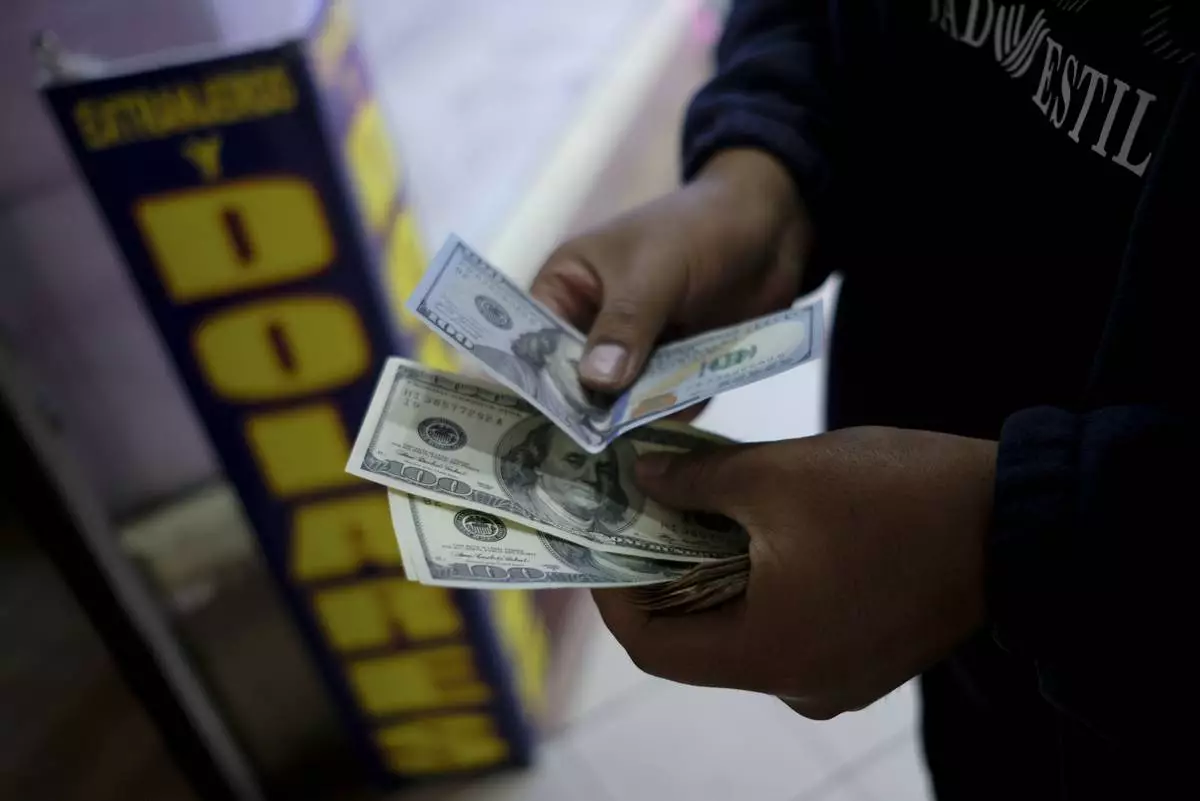
A man holds dollars at a currency exchange shop in La Paz, Bolivia, Friday, June 28, 2024, days after Army troops stormed the government palace in what President Luis Arce called a coup attempt. (AP Photo/Carlos Sanchez)
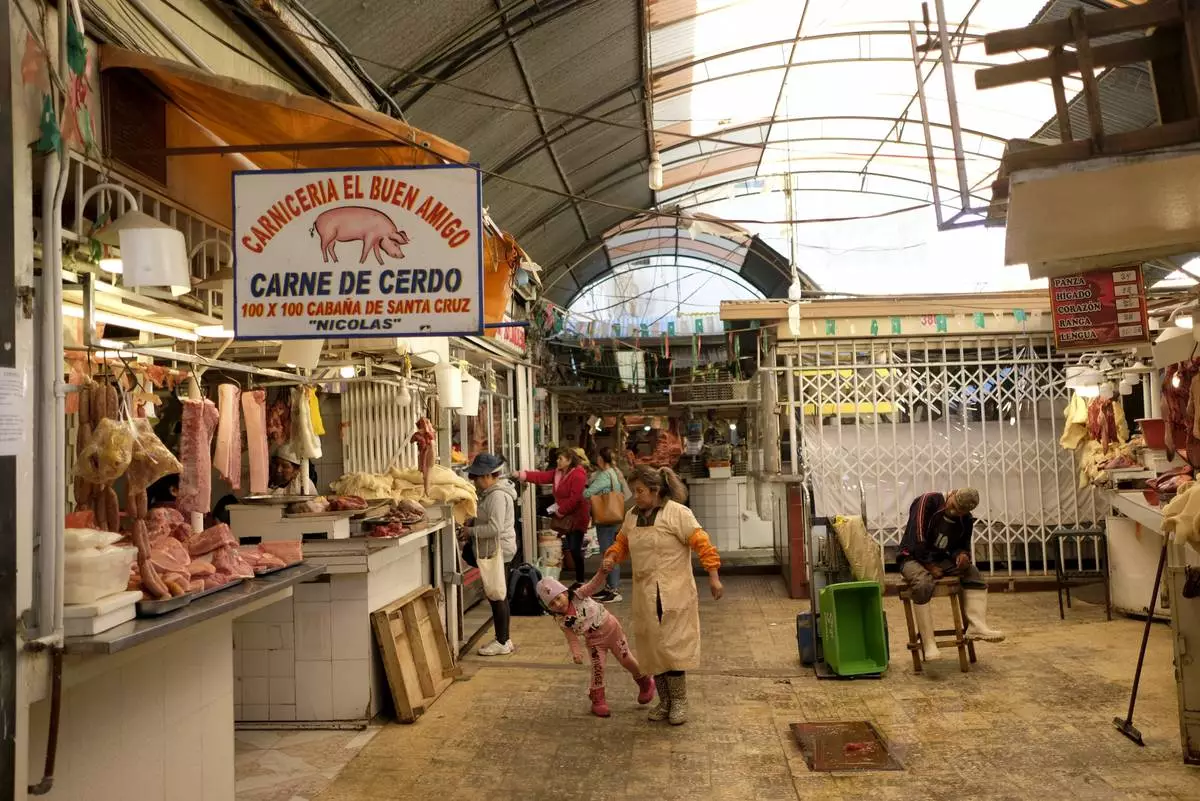
A woman holds a girl's hand in a market in La Paz, Bolivia, Friday, June 28, 2024, days after Army troops stormed the government palace in what President Luis Arce called a coup attempt. (AP Photo/Carlos Sanchez)
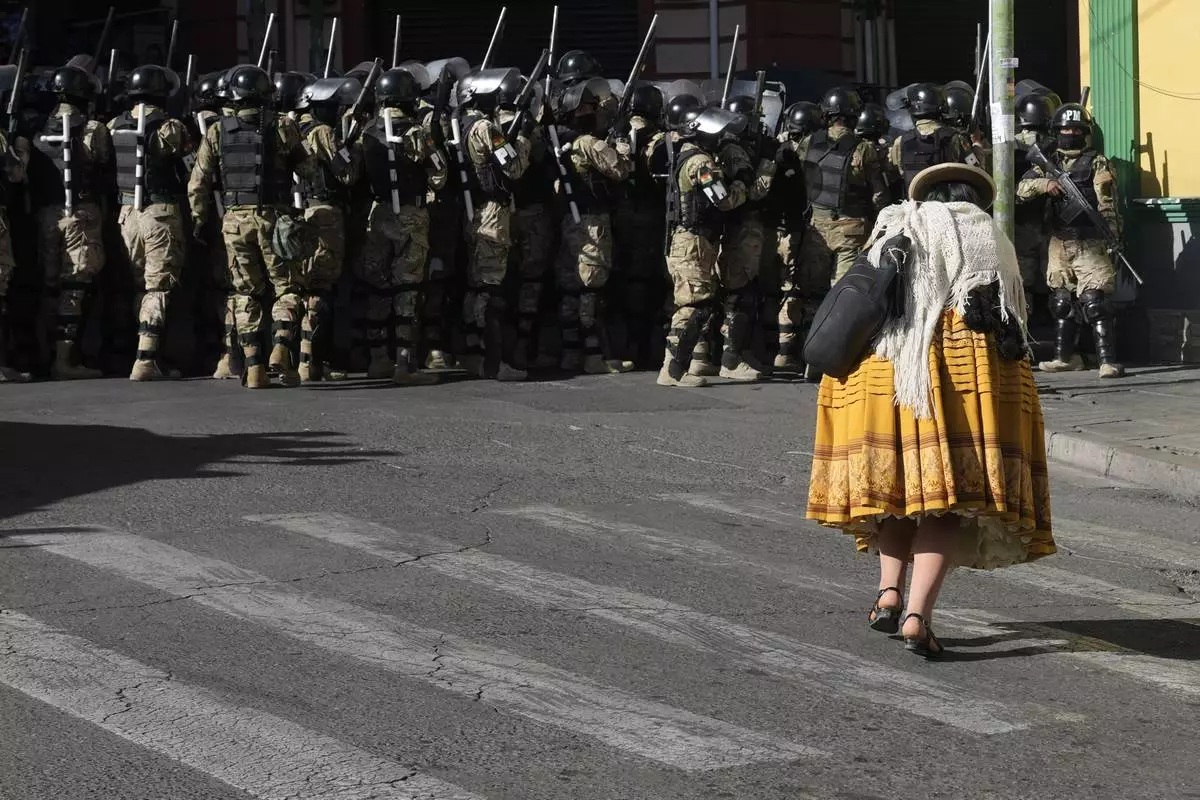
A woman walks by military police in Plaza Murillo, in La Paz, Bolivia, Wednesday, June 26, 2024. Armored vehicles rammed into the doors of Bolivia's government palace located in Plaza Murillo, on Wednesday as President Luis Arce said the country faced an attempted coup. (AP Photo/Juan Karita)
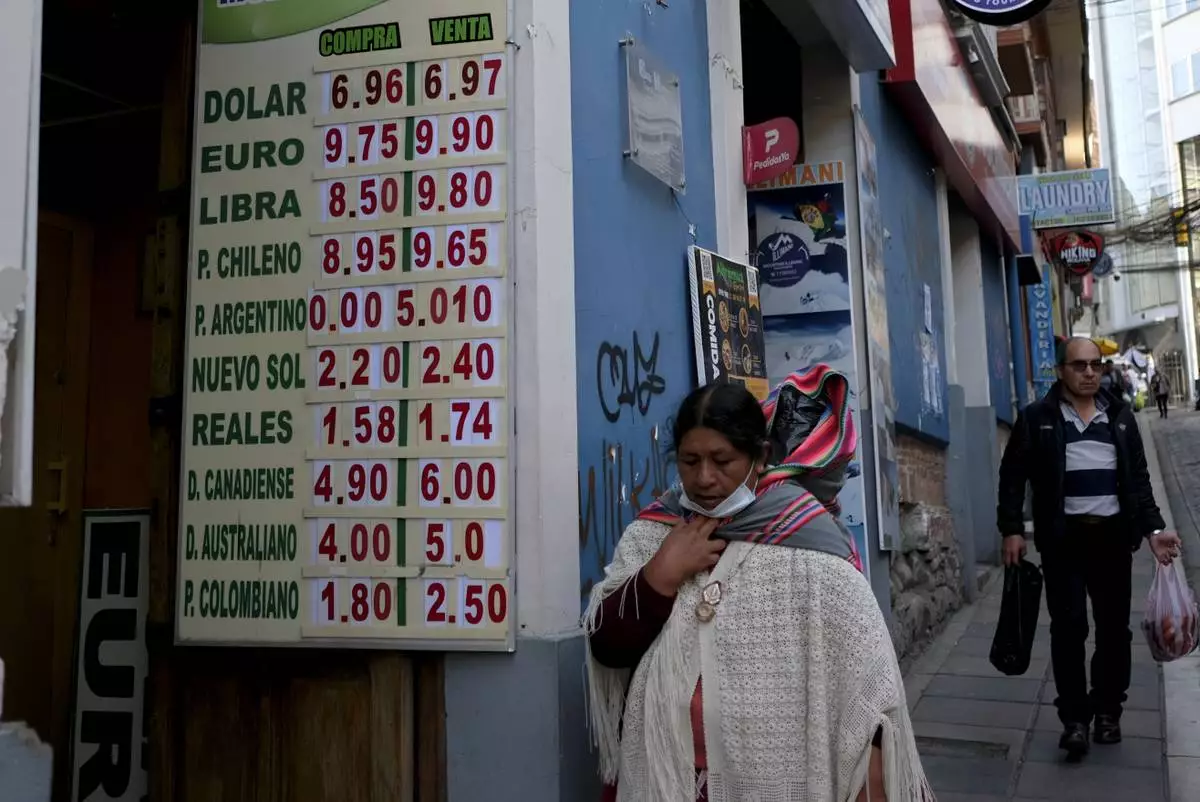
A woman walks by a sign showing the currency exchange rate in La Paz, Bolivia, Friday, June 28, 2024, two days after Army troops stormed the government palace in what President Luis Arce called a coup attempt. (AP Photo/Carlos Sanchez)
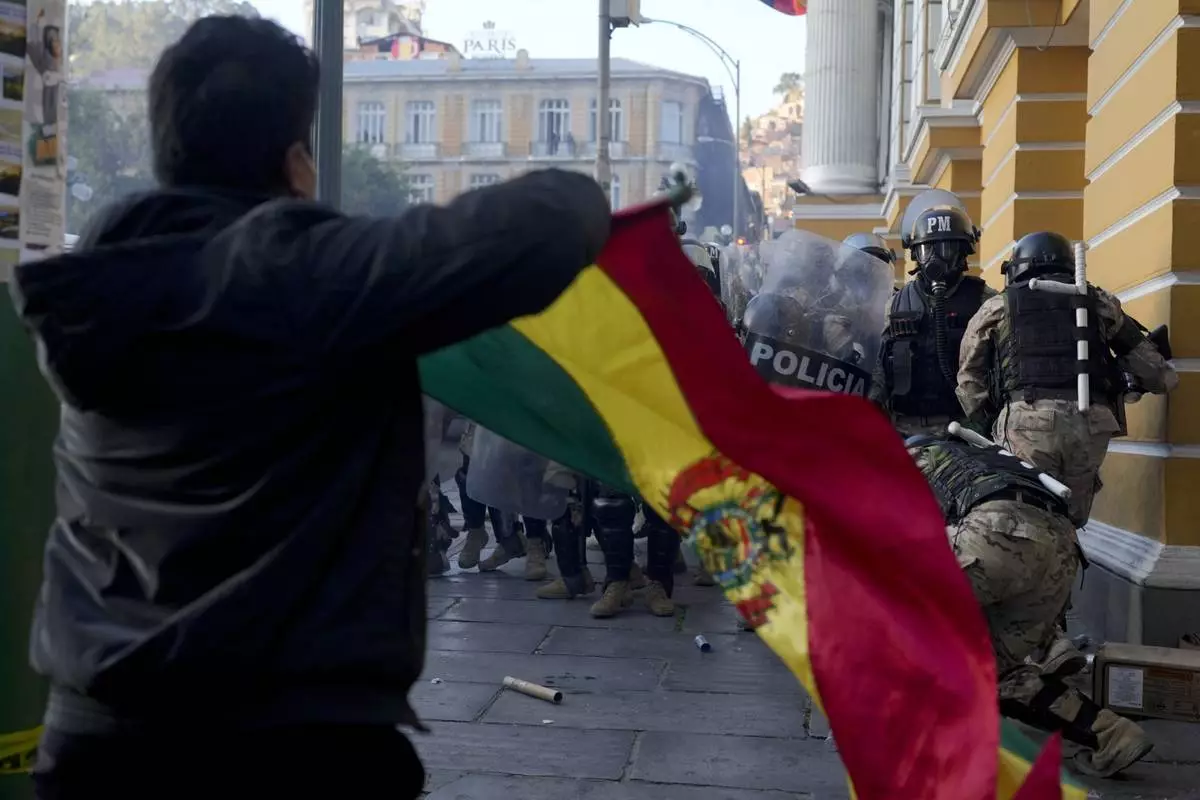
A supporter of President Luis Arce waves a Bolivian flag as soldiers flee from Plaza Murillo, after a failed coup attempt, in La Paz, Bolivia, Wednesday, June 26, 2024. Armored vehicles rammed into the doors of Bolivia's government palace located in Plaza Murillo as Arce said the country faced an attempted coup. (AP Photo/Juan Karita)
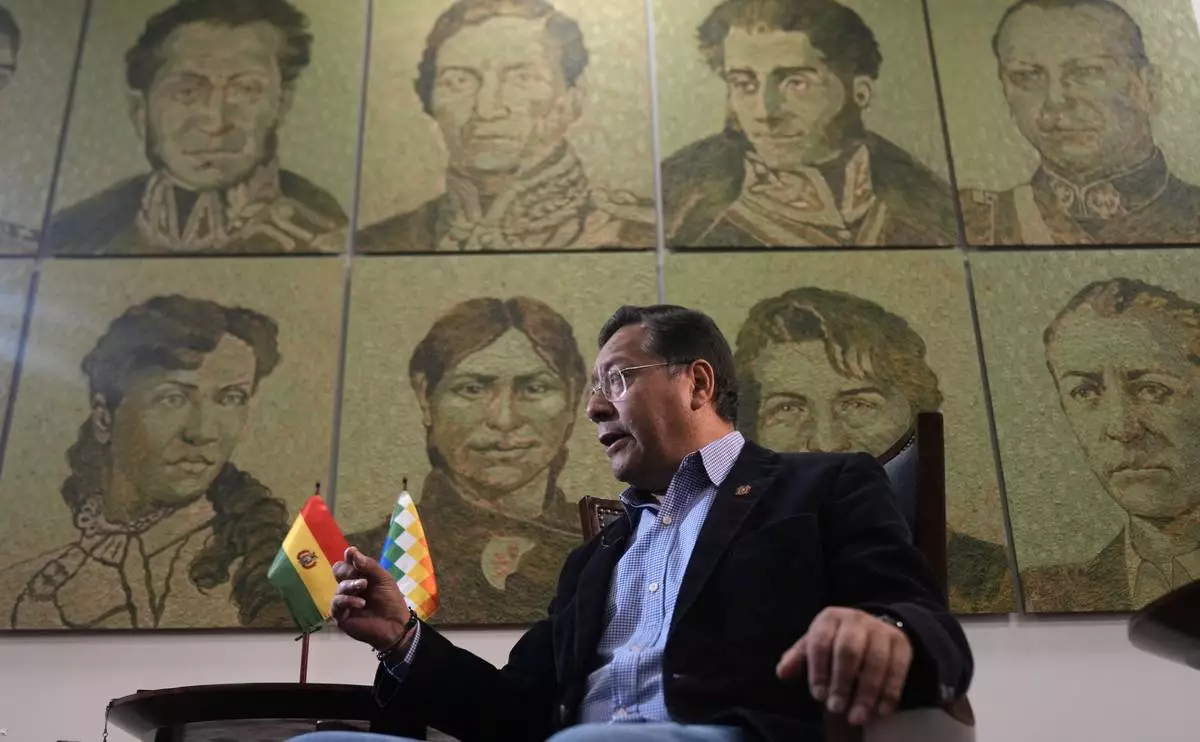
Bolivia's President Luis Arce speaks during an interview at the government palace, in La Paz, Bolivia, Friday, June 28, 2024, two days after Army troops stormed the palace in what Arce called a coup attempt. (AP Photo/Juan Karita)
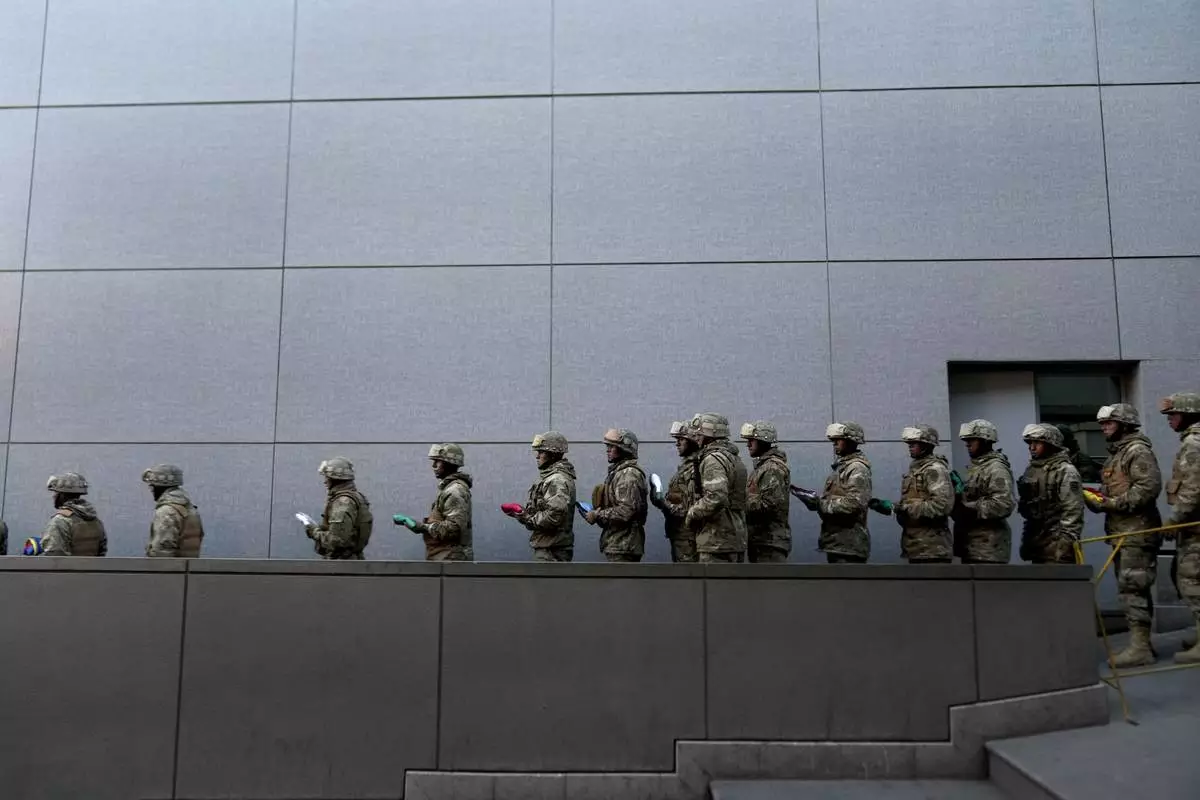
Soldiers return to the government palace after lowering the Bolivian national flag at Murillo square in La Paz, Bolivia, Friday, June 28, 2024, two days after Army troops stormed the government palace in what Bolivia's President Luis Arce called a coup attempt. (AP Photo/Juan Karita)
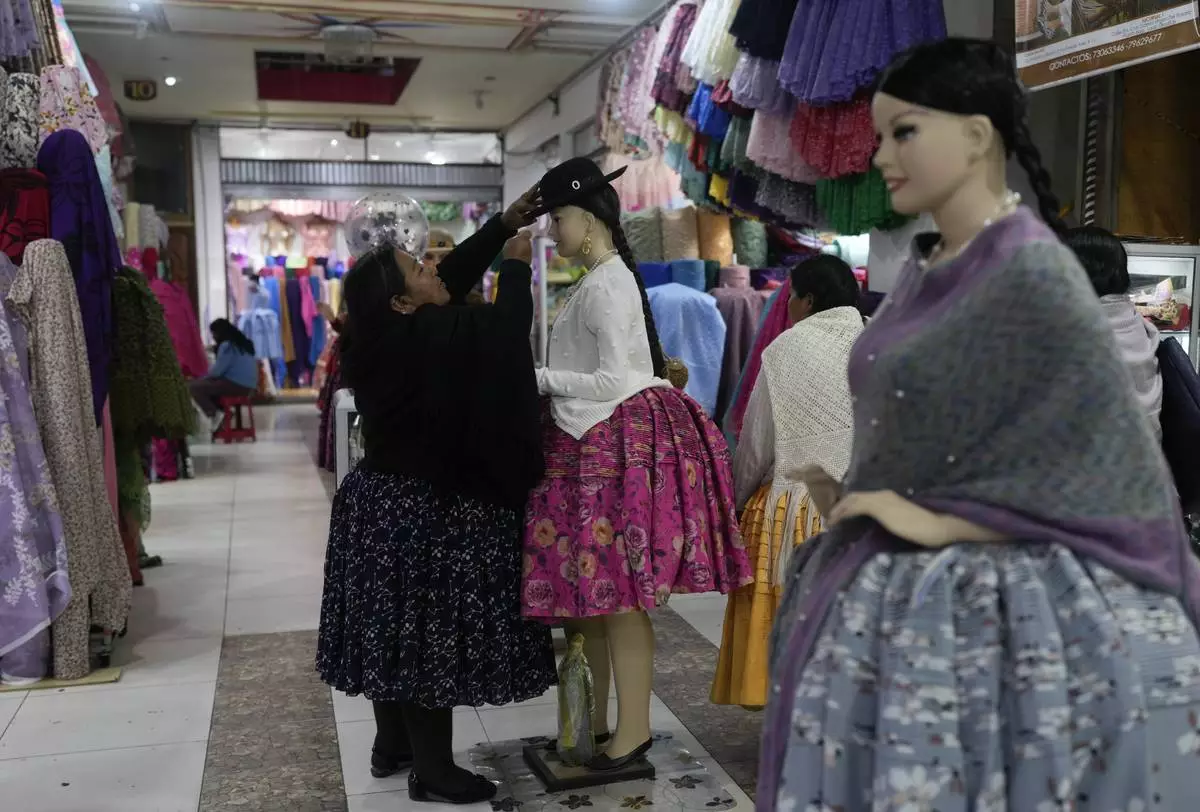
Celia Jaliri places a hat on a mannequin while waiting for customers in her clothing store for Cholitas in La Paz, Bolivia, Saturday, June 29, 2024, days after Army troops stormed the government palace in what President Luis Arce called a coup attempt. (AP Photo/Juan Karita)
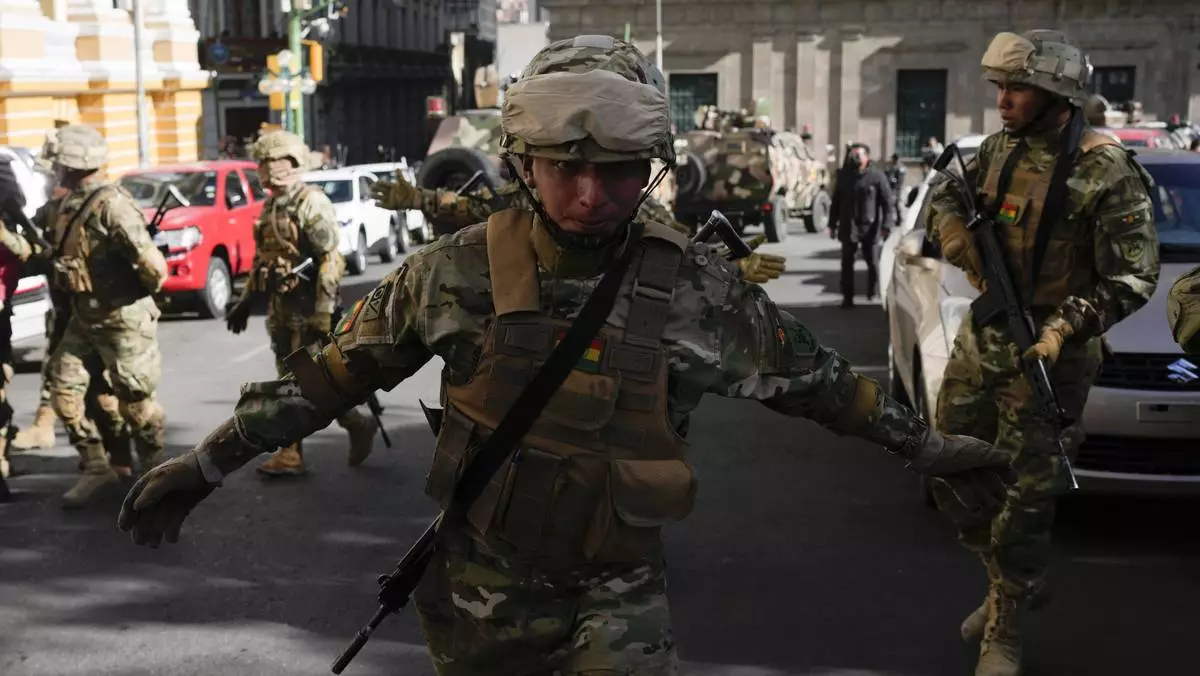
A soldier gestures for journalists to leave Plaza Murillo as soldiers gather outside the presidential palace in Plaza Murillo in La Paz, Bolivia, Wednesday, June 26, 2024. Bolivian President Luis Arce warned Wednesday that an “irregular” deployment of troops was taking place in the capital, raising concerns that a potential coup was underway. (AP Photo/Juan Karita)
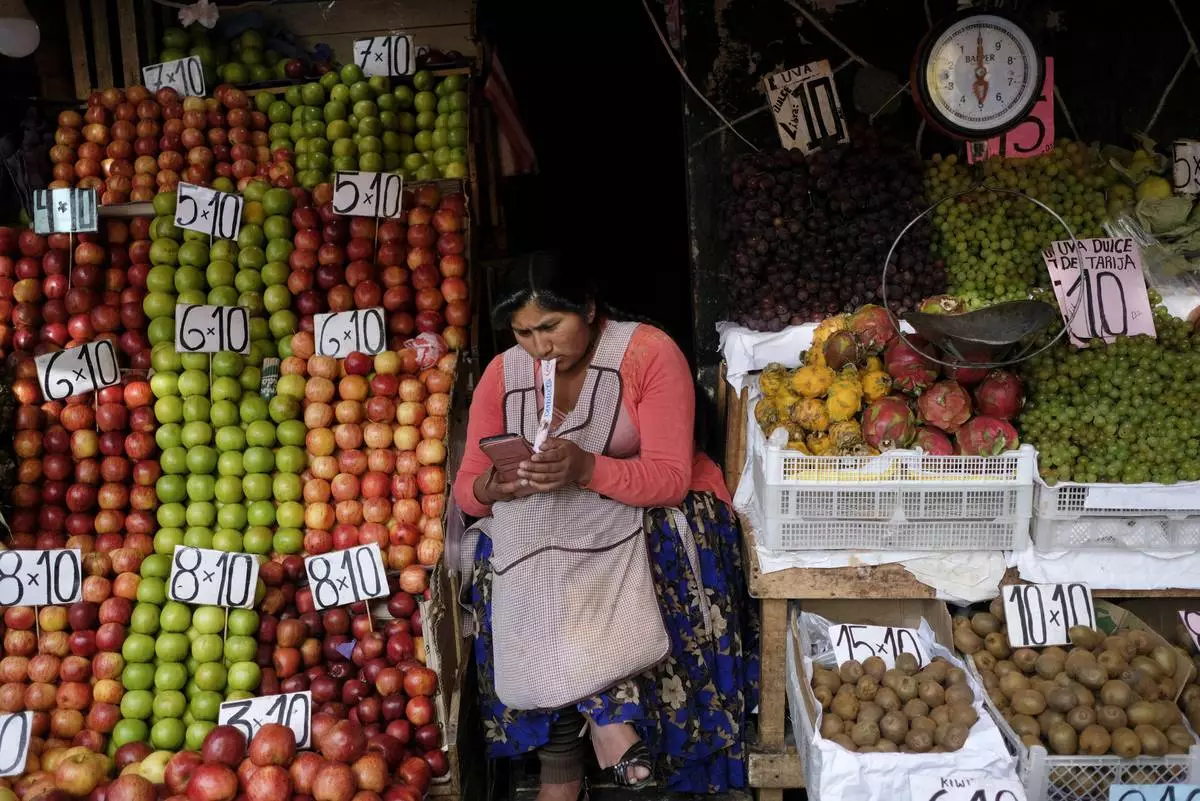
A vendor waits for customers at her produce stand, a day after Army troops stormed the government palace in what President Luis Arce called a coup attempt, in La Paz, Bolivia, Thursday, June 27, 2024. (AP Photo/Carlos Sanchez)


